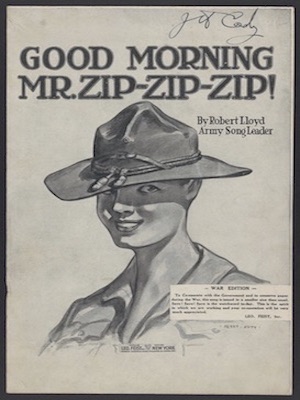
Good Morning Mr. Zip, Zip, Zip!
Live Version
Studio Version
Sheet Music
Student Essay
Music Changed the World: 1914 – 1918
The Great War was different than nearly all previous conflicts in that it recognized the importance of the public opinion as a significant force. Europe was grueling and traumatic for all the soldiers on the front, and unrestricted warfare allowed for the liberal use of chemical warfare and other heinous war crimes. Music motivated soldiers to continue forward with hope that they could one day return home. The military began to see music not just as a luxury, but as a necessity for their troops. So, the military started sending performers to Europe to perform for soldiers at field stations, music halls became ubiquitous at military camps, and a select few recruits were even trained to be song leaders. Militaries also began to incorporate music into part of their training exercises to instill discipline. They trained soldiers to lead chants and even built music halls around the camps. A musical list from one of the more successful programs at Camp Lewis included songs like “Keep Your Head Down," "Over There," "Battle Hymn for the Republic," and “Good Morning Mr. Zip-Zip-Zip.”
“Good Morning Mr. Zip-Zip-Zip” is a phenomenal example of a piece of music that followed a musical formula that is common of Tin Pan Alley music of this time. Structurally, “Good Morning Mr. Zip-Zip-Zip” exemplifies early twentieth century popular music form with a lyrical pattern of AABA’ and a simple chord progression following an I - V - I format. The lyrics “Good morn – ing, Mis-ter Zip-Zip-Zip, With your hair cut just as short as mine...” referred to the soldier's short haircut while “...ol-ive drab and kha-ki..” referred to the soldiers' uniforms. The overall cheerful melody and lyrics implies that this soldier has a great life, 'he is making good life decisions, why not you?' Mr. Zip-Zip-Zip would be equivalent to today's Mr. Blah-Blah-Blah, meaning that any man could be the admirable soldier the song is portraying if they so choose to join the armed forces.
Related Resources
Auerbach, Jonathan, and Russ Castronovo. Oxford handbook of propaganda studies. Oxford: Oxford University Press, 2013.
Cohan, George. "Over There." New York: William Jerome Publishing, 1917.
Crawford, Richard. After the ball: The Rise of Tin Pan Alley. In America's Musical Life: A History, 471-494. New York: W.W. Norton & Company, 2001.
Creel, George. How We Advertised America. New York: Harper & Brothers Publishers, 1920.
Cruttwell, C.R.M.F. A History of the Great War 1914-1918. Chicago: Chicago Review Press, 1991.
George Mason University. “'After the Ball': Lyrics from the Biggest Hit of the 1890s." Accessed April 2nd, 2018. http://historymatters.gmu.edu/d/5761/
Gier, Christina. "The “Song Leaders” of the American Expeditionary Forces, 1917-18.” Journal of Musicological Research 33: 130-144.
Gier, Christina. Singing, Soldiering, and Sheet Music in America during the First World War. Lanham: Lexington Books, 2017.
Harris, Charles K. "After the Ball." Boston: Oliver Ditson Company, 1891.
Lloyd, Roberts. "Good Morning Mr. Zip-Zip-Zip." New York: Leo Feist Inc., 1918.
Walton, Douglas. "What Is Propaganda, and What Exactly Is Wrong with It." Public Affairs Quarterly 11, no. 4 (Oct., 1997): 383 – 413.
Written by
Robert Nordin is a third-year biology major and Student Researcher in the ReSounding the Archives project at the University of Virginia. Music has always been an interest because it has a unique ability to bring together people who would not typically interact.
Song Information
Recording Information
Performers

James Stevens is a second-year graduate student pursuing a degree in Vocal Performance in the studio of Professor John Aler at George Mason University. His recent Mason Opera appearances include Albert Herring in Benjamin Britten's Albert Herring, Lord Tolloler in Gilbert and Sullivan's Iolanthe, and King Kaspar in Menotti's Amahl and the Night Visitors. His recent concert appearances include singing with the Central Maryland Chorale and the Symphonette at Landon.

Faith Ellen Lam is a sophomore Honors College student at George Mason University where she is a dual major in Music Performance and English. She is in the piano studio of Dr. Linda Monson. She has performed in such prestigious halls as Weill Recital Hall in Carnegie Hall, New York, and the Millennium Stage at the Kennedy Center, and has been invited to play in numerous masterclasses with artists such as Stanislav Khristenko, Jeffrey Siegel, and the Ensemble da Camera of Washington.
Live Version

Eli Stine is a composer, programmer, and educator. He is currently pursuing a Ph.D. in Composition and Computer Technologies as a Jefferson Fellow at the University of Virginia. Stine's work explores electroacoustic sound, multimedia technologies (often custom-built software, video projection, and multi-channel speaker systems), and collaboration between disciplines (artistic and otherwise).
Studio Version



Song Transcription
[Verse 1]
We come from ev’ry quarter,
From North, South, East, and West
To clear the way to freedom
For the land we love the best.
We’ve left our occupations and homes, so far and dear,
But when the going’s rather rough,
We raise this song of cheer:
[Chorus x2]
“Good morning, Mister Zip-Zip-Zip,
With your hair cut just as short as mine,
Good morning, Mister Zip-Zip-Zip, you’re surely looking fine,
Ashes to ashes, and dust to dust,
If the Camels don’t get you the Fatimas must,
Good morning, Mister Zip-Zip-Zip,
With your hair cut just as short as,
Your hair cut just as short as,
your hair cut just as short as mine.”
[Verse 2]
You see them on the highway,
You meet them down the pike,
In olive drab and khaki are soldiers on the hike;
And as the column passes, the word goes down the line,
“Good morning Mister Zip-Zip-Zip, you’re surely looking fine.”
[Chorus]